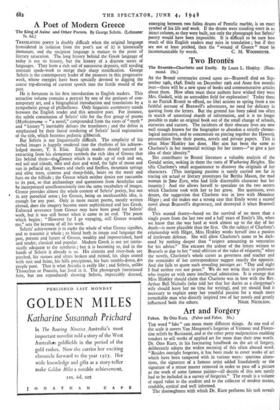Two Brontës
The Brontes—Charlotte and Emily. By Laura L. Hinkley. (Ham- mond. 15s.) As the Brontë centenaries crowd upon us—Branwell died on Sep- tember azith, 1848, Emily on December 19th and Anne five months later—there will be a new spate of books and commemorative articles about them. How often must these authors have wished they were Mrs. Gaskell, with an untrodden field for exploration! Today there is no Patrick Brontë to offend, no libel actions to spring from a too faithful account of Branwelrs adventures, no need for delicacy in quoting from the letters. But the ground has been raked too often in search of unnoticed shards of information, and it is no longer possible to make an original book out of the small change of schools, nurseries and curates. The incidents of their obscure lives are now well enough known for the biographer to abandon a strictly chrono- logical narrative, and to concentrate on piecing together the Haworth personalities from their poems, novels and private papers. This is what Miss' Hinkley has done. Her aim has been the same as Charlotte's in her memorial writings for her sisters—" to give a just idea of their identity."
She contributes- to Brontë literature a valuable analysis of the Gondal series, seeking in them the roots of Wuthering Heights. She sifts Charlotte's small acquaintance to discover the originals of her characters. (This intriguing pastime is surely carried too far in tracing six actual or literary prototypes for Bertha Mason, the mad woman in Pine Eyre, who had little discernible character but her insanity.) And she allows herself to speculate on the two secrets which Charlotte took with her to her grave. She questions, even denies, the suggestion that Charlotte was in love with Monsieur Heger; and she makes out a strong case that Emily wrote a second novel about Branwell's degeneracy, and destroyed it when Bramwell died.
This second theory—based on the survival of no more than a single poem from the last two and a half years of Emily's life, when we know that she was hard at work almost up to the day of her death—is more plausible than the first. On the subject of Charlotte's relationship with Heger, Miss Hinldey works herself into a passion of irrelevant defence. She will allow Charlotte's name to be dark- ened' by nothing deeper than "respect amounting to veneration for his advice." She excuses the ardour of the letters written to Brussels as due to her "total oblivion of the rules of etiquette," when the novels, Charlotte's whole career as governess and teacher and the remainder of her correspondence suggest exactly the opposite. And she fails to quote such revealing passages as : "Day and night I find neither rest nor peace." We do not write thus to professors who inspire us with mere intellectual admiration. It is strange that Miss Hinldey should claim that Charlotte was in love with the Rev. Arthur Bell Nicholls (who told her that her duties as a clergyman's wife should leave her no time for writing), and yet should find it necessary to explain away her youthful passion for a much more remarkable man who directly inspired two of her novels and greedy


































 Previous page
Previous page